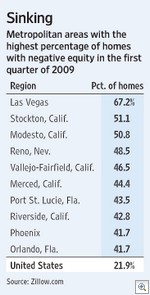Real Estate: Top Underwater Mortgage Cities
According to reports, 20% of U.S. homeowners owing more on a mortgage than their homes are  worth. The number of “underwater” borrowers is bad for them, but an opportunity for other first time home owners who were previously shut out of the process.
worth. The number of “underwater” borrowers is bad for them, but an opportunity for other first time home owners who were previously shut out of the process.
Real-estate Web site Zillow.com said that overall, the number of borrowers who are underwater climbed to 20.4 million at the end of the first quarter from 16.3 million at the end of the fourth quarter. The latest figure represents 21.9% of all homeowners, according to Zillow, up from 17.6% in the fourth quarter and 14.3% in the third quarter.
“What’s going on here is that you don’t have any markets that have turned around and you have new markets, like Dallas, that have joined the ranks” of communities where home prices have fallen, said Stan Humphries, a Zillow.com vice president.
What is interesting is the percentage of the top 10 “underwater” cities in the United States. As the Obama Administration looks to stabilize the housing market with tax dollars, why is it that the large percentage of underwater borrowers all seem to be in the same states? California, Florida and Nevada seem to be the worst hit.
Question One: Is the percentage of underwater borrowers inflated by some 4 or 5 states that have been hit worse than others where housing prices prior to the down turn in the economy were highly inflated? Not to make light of the situation, but does this mean that the government is going to help with car payments as well? The minute you drive off the lot in a new car the value of the car drops below what you just paid for it. Are bailouts next for car loans?
Question Two: Your home is an investment like a stock. Why would one stop paying their mortgage just because, at the present, the mortgage may be more the the worth of the home? Does that mean when home prices eventually come back in a cyclical manner that these same people who got tax payer bailouts through government incentive mortgage plans are going to pay back the difference?
If you liked this post, you may also like these:
Comments
4 Responses to “Real Estate: Top Underwater Mortgage Cities”
Leave a Reply

 RSS
RSS









Which metropolitian areas are suffering the least, Percentage wise I wonder?
It SHOULD mean that the US Taxpayers are investors in the houses and should get not only their money back, but a percentage of the profits.
But, of course, that won’t “spread the wealth” around so it won’t happen.
The ONLY WAY for The Imperial Organizer to successfully “spread the [our] wealth,” all of us who are not members of his ‘ruling class’ will have to share the poverty. The level playing field will be achieved by shoveling the wealth of the high spots (achievers) into the potholes (pockets of spendthrifts). Rise up and you become a ‘bump’ in our effete autocrat’s concept of a “level playing field.” America is about to become the biggest T-Ball park in the world!
The car analogy is so overused and idiotic. People expect a car to lose 10-20% of its value the minute you drive it off the lot. A car is a depreciating asset in 99.9% of cases. When you buy a house it is expected that over time it will increase in value. If you bought a house in 2006 in one of the bad markets it probably won’t be worth what you paid even by 2020. I’m so sick of people trying to use the car analogy, you have to be really stupid if you think this is truly analogous. Even cars don’t lose value as quickly as housing has. How do you tell someone who bought a house in 2006 (first house I might add) that the home they purchased for $400,000 is now worth $150,000. Oh and by the way you pay $6100 a year in property taxes (even though they banked lied and said it would only be $4000), but the people buying houses now only pay $3000 in taxes. How is this in any way fair? Anyone in this situation with a brain will take their year of free rent and give the keys back to the bank.